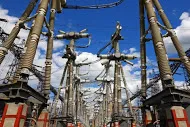
Malaysia's Tenaga Nasional unfazed by lack of tariff adjustment in 2015
Even earnings remain unscathed.
It has been noted that Malaysia-based Tenaga Nasional (TNB) is unaffected by lack of tariff adjustment in 2015 as indicated in the recent revised 2015 budget by the government due to the sharp decline in crude oil prices.
According to a research note from Nomura, to recap, the electricity tariff in Peninsular Malaysia is determined through the Incentive-Based Regulation (IBR) framework and the Imbalanced Cost Pass-Through (ICPT) mechanism implemented in January 2014.
The ICPT allows the government to review the tariff every six months based on changes in fuel and generation costs.
ICPT takes into account changes in the price of piped gas, LNG, coal, medium fuel oil, distillate and other generation costs such as those related to the PPAs, displaced cost from Renewable Energy and the cost of importing electricity.
Here's more from Nomura:
To maintain the electricity tariff rate in 1H2015, the ICPT cost increase of MYR847.96mn in 2014 will be absorbed through government savings obtained from the renegotiation of the Power Purchase Agreements (PPAs) with the first generation IPPs, instead of a net tariff hike of 1.62sen/kWh for TNB.
TNB’s earnings are also unaffected by the 5.8% average tariff cut announced by the government yesterday, for four months from 1 March-30 June 2015, as the shortfall in revenue will be compensated by fuel saving under IC of MYR727mn.
After the successful implementation of ICPT, TNB is in discussion with the Energy Commission and the government on implementation of the IBR for TNB to enjoy stable returns.
Finalisation of IBR will be the next re- ating catalyst for TNB, in our view. We believe a sustained ICPT exercise and stable return under IBR could lead to more active capital management.
Lower gearing in FY16F: We believe Malaysia’s improving regulatory framework within the power sector paves the way for strong earnings and FCF visibility for TNB. The successful implementation of IBR will lead to stronger earnings visibility for TNB because it would be able to pass on incremental fuel costs and enjoy stable regulated return of 7.5% on its asset base.
As at end-November 2014, TNB’s total debt exposure is MYR25.3bn (gross gearing: 35.6%; net gearing: 28.7%). We expect net gearing to fall further in FY16F to 23% given its improving outlook with capacity additions and lower cost pressure.
The low level of gearing is less than ideal and could point towards: (1) more active capital management; and/or (2) gearing up to finance future capex – particularly for its T&D regulated asset base.













 Advertise
Advertise











